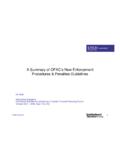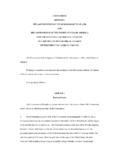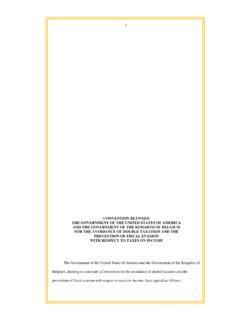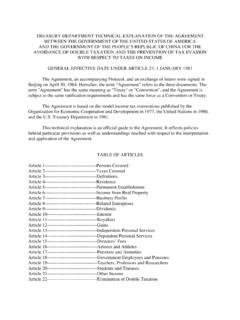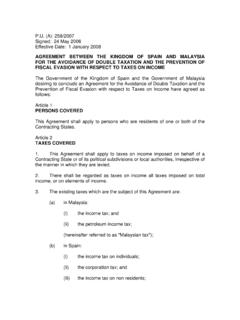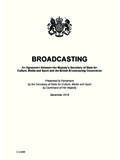Transcription of Limited Lifting of Sanctions as part of the Recent Initial ...
1 Economic Sanctions Lawyers Washington, DC. Limited Lifting of Sanctions as part of the Recent Initial agreement between the P5+1 (the United States, United kingdom , France, Germany, Russia, China, facilitated by the European Union) and Iran November 29, 2013. Introduction On November 23, 2013, the P5+1 and Iran reached an Initial agreement with respect to Iran's nuclear program. The agreement is an Initial step towards a comprehensive agreement between the P5+1 and Iran and reflects the first meaningful limits that Iran has accepted with respect to its nuclear program over the last 10 years. In return and as part of this Initial agreement reached on November 23, the P5+1 will provide Limited Sanctions relief to Iran by Lifting some of the current Sanctions against Iran. The relief is structured in a way that the overwhelming majority of the current Sanctions regime, including the key oil, banking and financial Sanctions remain in place.
2 These current Sanctions will continue to be vigorously enforced. If Iran fails to meet its commitments under the November 23 agreement , the Limited Sanctions relief will be revoked and additional Sanctions will be imposed on Iran. 1. Economic Sanctions Lawyers Washington, DC. Limited Sanctions Relief/ Lifting of Sanctions The White House has stated that specifically the P5+1 has committed to: Not impose new nuclear-related Sanctions for six months, if Iran abides by its commitments under this deal, to the extent permissible within their political systems. Suspend certain Sanctions on gold and precious metals, Iran's auto sector, and Iran's petrochemical exports, potentially providing Iran approximately $ billion in revenue. License safety-related repairs and inspections inside Iran for certain Iranian airlines. Allow purchases of Iranian oil to remain at their currently significantly reduced levels levels that are 60% less than two years ago.
3 $ billion from these sales will be allowed to be transferred in installments if, and as, Iran fulfills its commitments. Allow $400 million in governmental tuition assistance to be transferred from restricted Iranian funds directly to recognized educational institutions in third countries to defray the tuition costs of Iranian students. Humanitarian Transactions Facilitate humanitarian transactions that are already allowed by law. Humanitarian transactions have been explicitly exempted from Sanctions by Congress so this channel will not provide Iran access to any new source of funds. Humanitarian transactions are those related to Iran's purchase of food, agricultural commodities, medicine, medical devices; the P5+1, and specifically the United States, would also facilitate transactions for medical expenses incurred abroad. This channel would be established for the benefit of the Iranian people.
4 Limited Sanctions Relief in Perspective Except for the above, all other current Sanctions against Iran remain in force and will be vigorously enforced. According to the White House: Sanctions affecting crude oil sales will continue to impose pressure on Iran's government. The United States, working with its international partners, have cut Iran's oil sales from million barrels per day (bpd) in early 2012 to 1 million bpd today, denying Iran the ability to sell almost million bpd -- a loss of more than $80 billion since the beginning of 2012 that Iran will never be able to recoup. Under this first step of the November 23 agreement , the EU crude oil ban will remain in effect and Iran will be held 2. Economic Sanctions Lawyers Washington, DC. to approximately 1 million bpd in sales, resulting in continuing lost sales worth an additional $4 billion per month, every month, going forward.
5 Sanctions affecting petroleum product exports to Iran, which result in billions of dollars of lost revenue, will remain in effect. The vast majority of Iran's approximately $100 billion in foreign exchange holdings remain inaccessible or restricted by the Sanctions . Other significant parts of the Iran Sanctions regime remain intact, including: o Sanctions against the Central Bank of Iran and approximately two dozen other major Iranian banks and financial actors;. o Secondary Sanctions , pursuant to the Comprehensive Iran Sanctions , Accountability, and Divestment Act (CISADA) as amended and other laws, on banks that do business with individuals and entities;. o Sanctions on those who provide a broad range of other financial services to Iran, such as many types of insurance; and, o Restricted access to the financial system. All Sanctions on over 600 individuals and entities targeted for supporting Iran's nuclear or ballistic missile program remain in effect.
6 Sanctions on several sectors of Iran's economy, including shipping and shipbuilding, remain in effect. Sanctions on long-term investment in and provision of technical services to Iran's energy sector remain in effect. Sanctions on Iran's military program remain in effect. Broad restrictions on trade with Iran remain in effect, depriving Iran of access to virtually all dealings with the world's biggest economy All UN Security Council Sanctions remain in effect. All of the targeted Sanctions related to Iran's state sponsorship of terrorism, its destabilizing role in the Syrian conflict, and its abysmal human rights record, among other concerns, remain in effect. 3. Economic Sanctions Lawyers Washington, DC. A Process Towards a Comprehensive Solution During the six-month Initial phase of the November 23 agreement , the P5+1 and Iran will negotiate the framework of a comprehensive solution and agreement .
7 The next six months will show whether a comprehensive agreement and solution can be reached between the P5+1 and Iran. All Sanctions will not be Immediately Lifted; Total Lifting will be a Gradual, Incremental Process Lifting will be incremental and dependent on political progress and verifiable/concrete steps by Iran. Additional Sanctions relief for Iran and the additional Lifting of Sanctions will be dependent on the progress made with Iran on the diplomatic and political front and the concrete steps taken by Iran demonstrating its commitment to live up to its agreements. For certain of the Sanctions Against Iran (such as those governed by Executive Orders and the Iranian Transactions and Sanctions Regulations) further Lifting of Sanctions will come in the form of General Licenses or More Favorable Consideration of Specific License Requests The Presidential Executive Orders Governing Sanctions Against Iran: Executive Order 13628 Authorizing the Implementation of Certain Sanctions Set Forth in the Iran Threat Reduction and Syria Human Rights Act of 2012 and Additional Sanctions with Respect to Iran (Effective Date - October 9, 2012).
8 Executive Order 13622 Authorizing Additional Sanctions With Respect to Iran (Effective Date - July 30, 2012). Executive Order 13608 Prohibiting Certain Transactions With and Suspending Entry Into the United States of Foreign Sanctions Evaders With Respect to Iran and Syria (Effective Date - May 1, 2012). Executive Order 13606 Blocking the Property and Suspending Entry Into the United States of Certain Persons With Respect to Grave Human Rights Abuses by the Governments of Iran and Syria via Information Technology (Effective Date - April 23, 2012). Executive Order 13599 Blocking Property of the Government of Iran and Iranian Financial Institutions (Effective Date - February 6, 2012). Executive Order 13590 Authorizing the Imposition of Certain Sanctions With Respect to the Provision of Goods, Services, Technology, or Support for Iran's Energy and Petrochemical Sectors (Effective Date - November 20, 2011).
9 4. Economic Sanctions Lawyers Washington, DC. Executive Order 13574 Authorizing the Implementation of Certain Sanctions Set Forth in the Iran Sanctions Act of 1996, as Amended (Effective Date - May 23, 2011). Executive Order 13553 Blocking Property of Certain Persons With Respect to Serious Human Rights Abuses By The Government of Iran and Taking Certain Other Actions (Effective Date - September 29, 2010). Regulations Governing Sanctions against Iran: 31 CFR Part 560 - Iranian Transactions and Sanctions Regulations 31 CFR Part 561 - Iranian Financial Sanctions Regulations 31 CFR Part 562 - Iranian Human Rights Abuses Sanctions Regulations Lifting of the Secondary Iran Sanctions (affecting persons and entities) will require acts of Congress Although many of the Sanctions against Iran have been imposed by executive Presidential action and they can be quickly lifted through the same Presidential action, the authority and requirement of many of the so-called secondary Sanctions against Iran is provided by legislation passed by the Congress and signed into law by the President.
10 The Lifting or removal of these statutorily mandated Sanctions (which leave little discretion to the President to impose Sanctions ) will require the enactment of new laws repealing them, and this process will be subject to time-consuming debate, skepticism and various political forces in the Congress. These secondary Iran Sanctions laws, in effect, tie the President's hands in being able to grant immediate Sanctions relief, and this issue or obstacle has been noted in the November 23 agreement . Statutes (Legislation) Governing the Secondary Sanctions against Iran which will require Congressional Action and Approval for Lifting : The Iran Sanctions Act of 1996, as amended (ISA), Comprehensive Iran Sanctions , Accountability and Divestment Act of 2010 (CISADA), The National Defense Authorization Act for the Fiscal Year 2012 (NDAA), 31 December 2011, implemented, in part, by Executive Order 13599 (Blocking Property of the Government of Iran and Iranian Financial Institutions), February 6, 2012, and relevant regulations, The Iran Threat Reduction and Syria Human Rights Act of 2012 (ITRSHRA).
